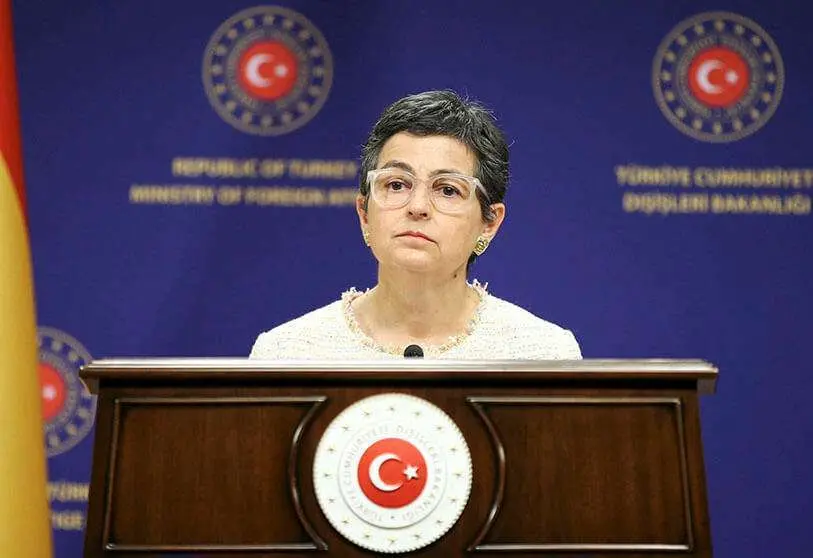Spanish diplomacy is at its lowest ebb

Since the times of Moratinos until now, the Santa Cruz Palace, headquarters of the Ministry of Foreign Affairs and Cooperation, did not receive as many and varied criticisms as in these last days. It has brought together several issues of capital importance for Spain in which the head of the Ministry of Foreign Affairs has shown little diplomatic skill, little knowledge of international resolutions, no coordination with other departments of the Spanish Government and raw inexperience disguised as false modernity and progressivism that brings nothing to the country, but quite the opposite. Inexperience is certain and verifiable. Previous considerations, if true, may be due to a new foreign doctrine in matters such as Gibraltar, which would require the same state position in all the political forces of the country, although to ask this of the current leaders of the political formations is to cry out in the desert: they are looking for confrontation and the wearing out of the adversary at any cost, rather than a real benefit for the citizens. Reviewing the issues in which Arancha González Laya has failed in this last week, we realize that Spanish diplomacy is under a minimum.
The Spanish Embassy in the United Kingdom has not even heard what the hosts of Boris Johnson, the pandering-to-the- people British Prime Minister, were ruminating about in relation to the fight against the virus that is stalking us. He did not make a single known move to prevent the announcement, on a Saturday night, of the mandatory two-week quarantine for all travellers from Spain. A deadly blow to tourism in the last week of July, the middle of a disastrous summer for the coronavirus and for the management of the Executive. Once the measure was announced, the government made it clear that it was holding a dialogue to ensure, in a wonderful gesture of magnanimity, that the unilateral quarantine would not include the Balearic and Canary Islands. Why those territories and not Andalusia or the Valencian Community, which also receive millions of British tourists every year? The Minister has not explained this publicly. The "negotiation" was nothing more than a new contempt by London for the Spanish diplomacy led by González Laya, because within a few hours British tea was being served in a double cup: an official recommendation to UK residents not to travel to Spain, including the islands that were of such concern in the "dialogue" childishly announced by Moncloa. The measures were extended rather than withdrawn. In between, a couple of appearances by the minister misinforming Spanish public opinion.
While Foreign Affairs "negotiated" and "dialogued" to ensure that the holidays of the English, Scottish, Welsh and Irish on our coasts would not be halted, the head of health information of the government gave the final touch to the strategy: "I am grateful that the Belgians decided not to recommend coming to Spain, it is a problem that they take away from us, reducing the risk of importing cases. Although I understand that it is better for the tourism sector that the Belgians come here, from a healthcare point of view, reducing the marginal risk helps us". "The fact that quarantine is required in a way favours us because it discourages people from coming from the United Kingdom".
Fernando Simón does not coordinate his statements with the Foreign Office. While some are trying hard to avoid vetoes on British tourism in Spain, others are happy with these vetoes and proclaim them at a press conference without the least embarrassment. Tenants at the Spanish Embassy in Chesham Place would be petrified to hear Dr. Simon proclaim his preference in the evening news: the health curve before the economy, bureaucratic graphics before jobs.
In between dishes, the minister had time to travel to Turkey just three days after the conversion to Islam of Istanbul's Hagia Sophia, an unexpected stroke of opportunity. In Ankara, another of her glorious mistakes of this fateful week for Spanish diplomacy: to claim, in front of her Turkish counterpart, Mevlüt Çavusoglu, that Hagia Sofia will from now on be "the common home of Christians and Muslims". A phrase for the history books, to be placed next to the Alliance of Civilizations. The Turkish minister wasted no time in clarifying to Laya that it will not be possible to open the basilica to rites other than Muslim and that it will not be a place where other faiths can pray. Did anyone warn the minister of the inappropriateness of her trip, and once it was done, of the inconvenience of those empty, good words, loaded with the most implacable nothingness?
Everything was already rarefied after the photograph that the head of the foreign policy department consented to with the political leader of Gibraltar, also known as the chief minister. Here we should also ask ourselves if no one warned of the enormous background that a bilateral meeting would take place, however informal they later told us it was, because until now no Spanish chancellor has accepted to meet with the 'mayor' of Gibraltar but with the authorities of the British government, the only interlocutor on its territoriality. If the minister was warned of this mistake, then the fundamental question is even more serious because it implies a change in the Spanish position after many years and governments of different colours.

